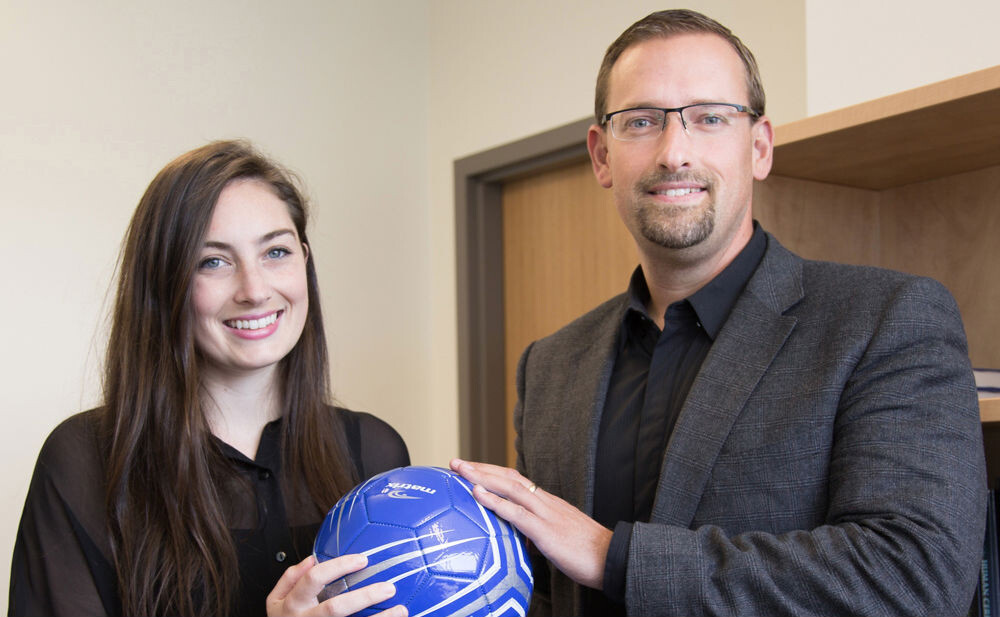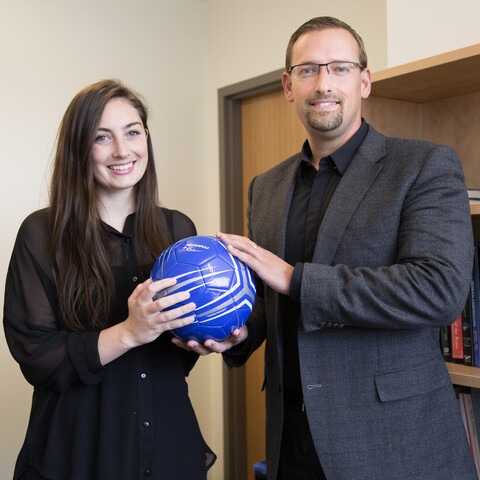Main Second Level Navigation
Breadcrumbs
- Home
- News & Events
- Recent News
- A Head's Up on Soccer Concussions
A Head's Up on Soccer Concussions

Suniya Kukaswadia

While the world is glued to the 2014 FIFA World Cup tournament in Brazil, U of T researchers are looking at how a favourite move may be harming players’ brains.
Dr. Tom Schweizer, an assistant professor in the Department of Surgery and director of the neuroscience research program at St. Michael's Hospital, is working with research student Monica Maher to examine the link between heading a soccer ball and the risk of concussion. They spoke to us about their results.
What were your findings?
Monica Maher We reviewed existing research that looked at what role exposure, gender differences and gameplay mechanisms have in the long- and short-term impact of concussions. There were a few things that stood out. Women, goalkeepers and defenders were most at risk for concussions, while player-to-player contact—such as bumping heads when going for a header—was the gameplay mechanism that caused the most concussions. In terms of heading, the evidence suggests prolonged heading exposure may impact a player’s memory and ability to focus later in life. We need to conduct more research to know what the exact implications—if any—there are.
Why do you think women are more likely to get a concussion?
MM We need to explore this further, but the evidence suggests that it is because of the biomechanical differences between genders. Men have stronger neck muscles than women, so they may be able to stabilize better after impact. Also, women may simply be more likely than men to report a suspected concussion, which may contribute to the higher rates.
Tom Schweizer I think it’s also interesting to compare amateur and professional players. Are professionals—who play every day and have balls kicked at them with incredible velocity—more at risk for long-term cognitive impairments than those who play for fun? If players sustain concussions for a certain period of time, and then take a break from playing, do their brains return to normal? We don’t have the answers yet, but this is where the research is going.
There’s a lot of talk about concussions and hockey. How do soccer-related concussions differ from the ones experienced by hockey players?
TS We can’t say for certain what the differences are because there isn’t a lot of research about soccer-related head injuries. Concussions are much more obvious in hockey because you can actually see the hit or the player go down. In soccer, players experience sub-concussive blows—associated with heading the ball— which aren’t as obvious. The ball hits your head, your brain gets rattled, but you don’t pass out, get dizzy, have vision loss or experience any of the other symptoms of a concussion. Although players may seem fine, we’re not sure what the cumulative effects of hundreds of headings over a lifetime are.
Do you think heading should be banned?
TS Definitely not. Soccer is an amazing sport with many cardiovascular and physiological benefits, and heading is an integral part of the game. No other sport requires players to use their heads in that way. As a father of two young kids I’m most concerned about how heading impacts brain development in children, especially those who are really young and don’t have the neck muscles to absorb the impact of the ball. Many kids want to imitate their favourite soccer stars, but don’t know how to head the ball properly. Depending on what future evidence reveals, coaches and parents may want to wait to introduce heading until kids are strong enough to handle the impact.
What’s next for you?
TS We want to further explore post-concussion symptoms (PCS) which result from concussions. We know that some people recover in a few days, whereas others take months. We want to know why this is and see if there are any markers to help us predict who is at risk for PCS. We can compare baseline data from a player’s non-concussed brain performance against what their brain looks like after their acute head injury.
Monica—you’re a varsity soccer player at U of T. Have you ever had a concussion?
MM I’ve played soccer since I was six, so it’s a significant part of my life. My mom encouraged me to wear a protective headband to help reduce risk of concussions, so safety has always been on my radar. I’ve never had a concussion, but a past teammate was off the field and out of the classroom for months after being hit in the head with a ball at close range.
News


